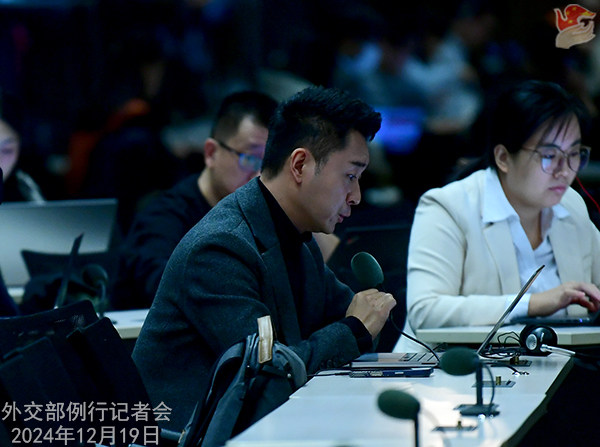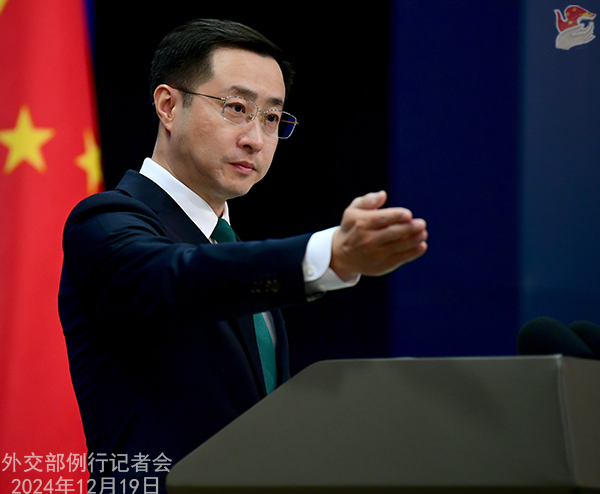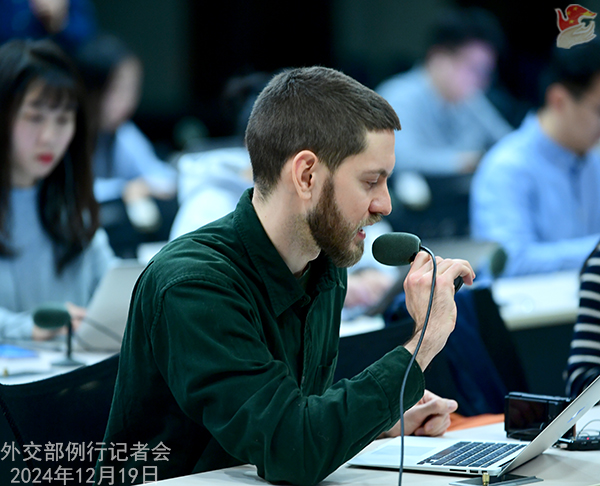
CCTV: The Central Economic Work Conference (CEWC) was successfully held last week. According to foreign media commentary, the CEWC shows that amid sluggish global recovery and unprecedented challenges facing globalization, China remains a top engine for global economic growth and will shore up its position in leading global growth. Also, according to the latest Sentiment Survey by the British Chamber of Commerce in China and the Business Confidence Survey by the German Chamber of Commerce in China, 76 percent of British companies are maintaining or increasing their investment in China, 92 percent of German companies plan to maintain their operations, and over half of German companies plan to increase investment within the next two years in China. What’s your comment?
Lin Jian: Over the course of this year, despite rising uncertainties in the global economy, China has been steadfastly pursuing high-quality development and high-standard opening up. China’s economy has been generally stable and continued to gain momentum, and remains a stabilizer and propeller for the global economy. In the first three quarters this year, China’s economy grew by 4.8 percent—one of the fastest among all major economies. In the first 11 months this year, China’s total foreign trade in goods grew by 4.9 percent year on year, and new foreign-funded companies in China increased by 8.9 percent. China is expected to hit this year’s economic and social development targets. China has held annually the China International Import Expo and the China International Supply Chain Expo for years running. China has granted all least developed countries having diplomatic relations with China zero-tariff treatment for 100 percent tariff lines, and abolished all market access restrictions on foreign investment in the manufacturing sector. China’s openness index is up 11.89 percent since 2008. China is also a major trade partner of over 150 countries and regions and has long been the world’s second largest recipient of foreign capital. As you mentioned, many foreign companies are planning to increase investment in China—a vote of confidence for the China market.
China’s economy has a stable foundation, numerous strengths, remarkable resilience and vast potential. The dominating trend of a sound Chinese economy for the long term and the elements supporting it have not changed. This is the major reason why China is fully confident in sharing its opportunities and prospering with the world. The CEWC once again sent the strong message of a more open China, which means China will not stop achieving a continued upward trajectory of the Chinese economy, and its commitment to promoting global development and prosperity through Chinese modernization will not change, and China’s resolve to share development opportunities with the world is as strong as ever. We welcome more foreign businesses to invest and thrive for the long term in China, and succeed and share a promising future together with China.
AFP: The United States Defense Department has released its annual report on China’s military and security developments in which it highlighted a wave of corruption across the PLA that has damaged China’s military modernization. What is the Foreign Ministry’s comment on the report?
Lin Jian: This report, like the ones we’ve seen before, lays little emphasis on truth. It is filled with bias and designed to amplify the “China threat” narrative only to justify the US’s desire to maintain military supremacy. China is fully committed to being a force for peace, stability and progress in the world. We are equally determined to defend our sovereignty, security and territorial integrity. We call on the US to abandon the Cold War mentality and hegemonic way of thinking, view China’s strategic intention and defense development in an objective and rational way, stop issuing this kind of irresponsible report year after year, and make sure what it does is conducive to a stable relationship between the two countries and the two militaries.
Xinhua News Agency: Recently, the US-based Foreign Policy magazine published an article titled “What China Got Right in Latin America,” noting that China’s offer to build large investments and address long-ignored developmental deficits in Latin America stands in contrast to high-minded rhetoric from the US-led West about ideologies. Have you noted the article and do you have any comment on that?
Lin Jian: I noted the article as well. If anyone wants to know what China got right in Latin America, the answer is pretty simple. China has all along observed the principles of mutual respect, equality, mutual benefit, openness, inclusiveness and win-win cooperation in growing friendly ties with Latin America. Between China and Latin America, there is no zero-sum and the-winner-takes-all geopolitical calculations, only sincere mutual support and cooperation for shared progress.
I believe many of you know that yesterday, the first ship departing from Peru’s Chancay Port and bound for Shanghai entered Shanghai’s port, marking the completion of the first ever two-way voyage between Chancay and Shanghai. Besides, in Colombia’s capital Bogotá, residents’ metro dream became true with the completion of Metro Line 1. The Helios wind power cluster in Argentina provides clean energy for 360,000 households. The first modern highway in Jamaica more than halved traffic time between the south and north coasts. Satellite cooperation between China and Bolivia ensured free access to TV programs for half a million households. These and many other projects have delivered tangibly to Latin American countries and made lives better for the local population.
“A port of all, a port for all” is a slogan on quay cranes at Chancay Port in Peru. Likewise, China-Latin America cooperation is a voluntary choice of both sides as it serves the interest of the two peoples. As Foreign Minister Wang Yi noted at the Symposium on the International Situation and China’s Foreign Relations recently, China will always be committed to unity and invigoration of the Global South and help fellow developing countries move faster in rejuvenation. As the world enters a new period of turbulence and transformation, China stands ready to work with countries in Latin America and the Caribbean (LAC) to continue to support each other through solidarity and cooperation and boost the connection and mutual learning between the Chinese dream and the LAC dream. We hope to see more infrastructure projects like Chancay Port whose running will deliver more benefits to the people in Latin America and the Caribbean in the future.

TASS: US Secretary of State Antony Blinken said in an interview with The Foreign Affairs that the US is aligning policies with Europe and with key partners in Asia and that China’s complaint is the greatest evidence of the success of the US’s approach. Blinken also said that Taiwan is not just China’s business but the world’s business and it is because the world would be influenced if there were to be a crisis over Taiwan. What’s China’s comment?
Lin Jian: China views and advances its relations with the US in accordance with the three principles of mutual respect, peaceful coexistence and win-win cooperation, and works to firmly defend its sovereignty, security and development interest. We believe that a new Cold War should not be fought and cannot be won. Containing China is unwise, unacceptable and bound to fail. When meeting with President Biden in Lima, President Xi Jinping listed seven experiences and inspirations drawn from the past four years of China-US interactions that point the way forward for bilateral relations. We hope it will register with the US side and the two sides will work together towards that end.
Taiwan is China’s Taiwan. The Taiwan question is purely China’s internal affair, which brooks no external interference. The greatest challenge to cross-Strait peace is “Taiwan independence” separatist activities and foreign interference and disruption. The US should abide by the one-China principle and the three China-US joint communiqués, act on its commitment of not supporting “Taiwan independence,” stop abetting “Taiwan independence” separatist forces, and stop interfering in China’s internal affairs on the Taiwan question.
Global Times: It is reported that Rahul Gupta, Director of the Office of National Drug Control Policy of the US, said on December 18 that since the San Francisco Summit between leaders of China and the US, the two countries have made significant progress on the fentanyl issue. China has taken offline many websites and online platforms that sell the precursors of fentanyl, made arrests, and scheduled over 50 controlled substances, which have contributed to the drop in overdose deaths. And it’s critical that the US should sustain this progress moving forward while working on other aspects in relationship with China. When asked about the threat of tariffs on the fentanyl issue by President-elect Donald Trump, Gupta said there’s no harm in keeping the pressure, and stressed the need to make sure the pressure is kept with a sense of understanding of what is already happening and the progress that’s already being made. What’s your comment?
Lin Jian: China is one of the world’s toughest countries on counternarcotics both in terms of policy and its implementation. China has given support to the US’s response to the fentanyl issue to assist global drug control and in the spirit of humanity and goodwill. China announced back in 2019 the decision to officially schedule fentanyl-related substances as a class. We are the first country in the world to do so.
Working together on counternarcotics is an important common understanding reached by Chinese and US presidents in their meeting in San Francisco. With China’s active effort, China-US counternarcotics cooperation has achieved positive progress. The two countries launched the Counternarcotics Working Group and carried out cooperation on the scheduling of drug-related substances, joint handling of drug-related cases, technology exchange, multilateral cooperation and removal of online ads.
China stands ready to continue the counternarcotics cooperation with the US on the basis of equality, mutual benefit and mutual respect. We hope the US will not take China’s goodwill for granted, and will value China’s contribution and effort, avoid undermining the foundation for the cooperation, and work with China to continue the positive dynamics in the counternarcotics cooperation.
Reuters: Thailand is hosting a meeting on the Myanmar issue, which is attended by Myanmar, China, Bangladesh and India. A topic to be discussed at the meeting is the Myanmar authorities’ plan to hold elections. Can the Foreign Ministry confirm that China is attending this meeting? If so, who is representing China? What is the Foreign Ministry’s expectation for this meeting? Does China support the Myanmar authorities in holding elections at a time when the conflicts in Myanmar are escalating?
Lin Jian: The Myanmar issue is by nature Myanmar’s internal affair. China supports the parties in Myanmar in properly handling differences through dialogue and consultation within the framework of the constitution and laws. China also supports the positive efforts of regional countries to restore stability and cool down the situation in Myanmar. Regarding the meeting you mentioned, I do not have information to share at the moment. We will release timely information if there’s any.
Dragon TV: It’s reported that on December 18, Chinese and Japanese experts held a new round of dialogue on the discharge of the Fukushima nuclear-contaminated water into the sea. Could you share more details with us?
Lin Jian: It is learned that on December 18, Chinese and Japanese experts held in Beijing the third round of technical dialogue on the discharge of the nuclear-contaminated water from Fukushima. They had in-depth and constructive discussions on long-term international monitoring arrangement and independent sampling and monitoring arrangement by China and all other stakeholders.

Reuters: According to report by WSJ, the US administration is considering a ban based on national security, and the target is a Chinese router manufacturer TP-LINK. What’s your comment?
Lin Jian: China opposes the US’s overstretching the concept of national security and its discriminatory practices targeting particular countries and companies. China will take resolute measures to firmly safeguard the legitimate and lawful rights and interests of Chinese companies.
AFP: Yesterday, in New York City, a man by the name of Chen Jinping pleaded guilty to harassing US-based Chinese dissidents on behalf of the Chinese government. He was accused last April of operating a secret police station for China’s Ministry of Public Security. Does China operate secret police stations in other countries and does the Foreign Ministry have any comment on Chen Jinping case?
Lin Jian: I am not familiar with the specifics about the case you mentioned. China is a country that upholds the rule of law, strictly abides by international law, and respects the judicial sovereignty of all countries. The so-called secret police stations do not exist.
Bloomberg: We reported that the UK is drawing up plans to cooperate more with China on investment and trade. Does the ministry have any comment?
Lin Jian: China and the UK are both major economies and financial heavyweights. Cooperation is rooted in the two countries’ shared interests and meets the expectation of the business community. It is mutually beneficial in nature. We hope the UK can work with China to deepen cooperation, deliver more by promoting China-UK economic ties, and better benefit the two peoples and the world at large.
Shenzhen TV: Yesterday, the 23rd meeting of Special Representatives for China-India Boundary Question was held in Beijing. Could you share with us what’s been achieved in the meeting? What’s your expectation for its future relations with India?
Lin Jian: On December 18, the 23rd meeting of Special Representatives for China-India Boundary Question was held in Beijing, the first in five years. China has released a readout on the talks. The two sides’ readouts share very much similar gists and elements. Let me share some details.
Based on the common understandings of the Chinese and Indian leaders in Kazan, China’s Special Representative on the China-India boundary question, Member of the Political Bureau of the CPC Central Committee, and Director of the Office of the Central Commission for Foreign Affairs Wang Yi and India’s Special Representative and National Security Adviser Shri Ajit Doval held substantive talks and reached the following six points of consensus on the China-India boundary question in a positive and constructive attitude.
Both sides positively evaluated the resolution reached on border-related issues between the two countries and reaffirmed the need to continue implementing the agreement. They agreed that the boundary question should be handled appropriately in the context of the overall bilateral relationship to ensure they do not affect the development of bilateral ties. Both sides also agreed to continue taking measures to maintain peace and tranquility in the border areas and to promote the healthy and stable development of bilateral relations. Both sides reaffirmed their commitment to continuing to seek a fair, reasonable, and mutually acceptable package settlement to the boundary question in accordance with the political parameters and guiding principles agreed upon by the two countries’ special representatives in 2005, and to taking active measures to advance this process. The two sides assessed the border situation and agreed to further refine the management rules for the border areas, strengthen confidence-building measures, and achieve sustainable peace and tranquility along the border. Both sides agreed to continue enhancing cross-border communication and cooperation, further strengthen the Special Representatives meeting mechanism, and hold a new round of Special Representatives talks in India next year.
At the meeting, Wang Yi also had in-depth and constructive discussion with Doval on China-India bilateral relations. Wang Yi said that as two major developing countries, representatives of emerging economies, and important members of the Global South, a healthy and stable China-India relationship is in the fundamental interest of the over 2.8 billion people of the two countries. This is also compatible with the trend of a rising Global South. The two sides need to have candid communication, enhance mutual trust, build consensus, and promote cooperation. It is important to channel the two countries’ respective valuable resources into development and revitalization, make sure that the boundary question is appropriately placed in bilateral relations, jointly maintain peace and tranquility in border areas, and strive to bring China-India relations back to a healthy and steady track at an early date.
